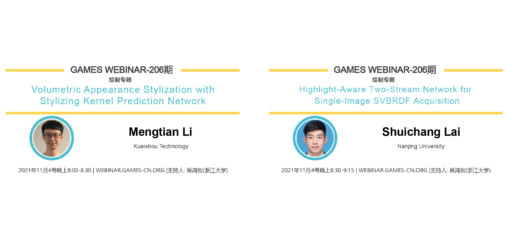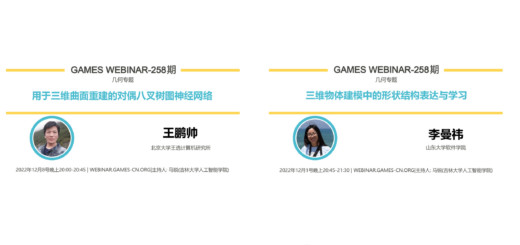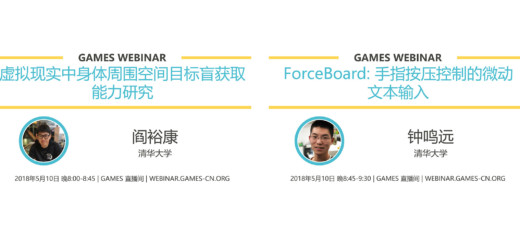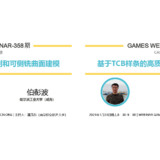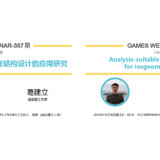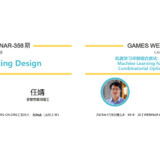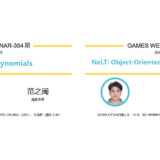GAMES Webinar 2020 – 156期(几何专题) | Lingjie Liu(Max Planck Institute for Informatics), Jianwei Guo(Institute of Automation, Chinese Academy of Sciences)
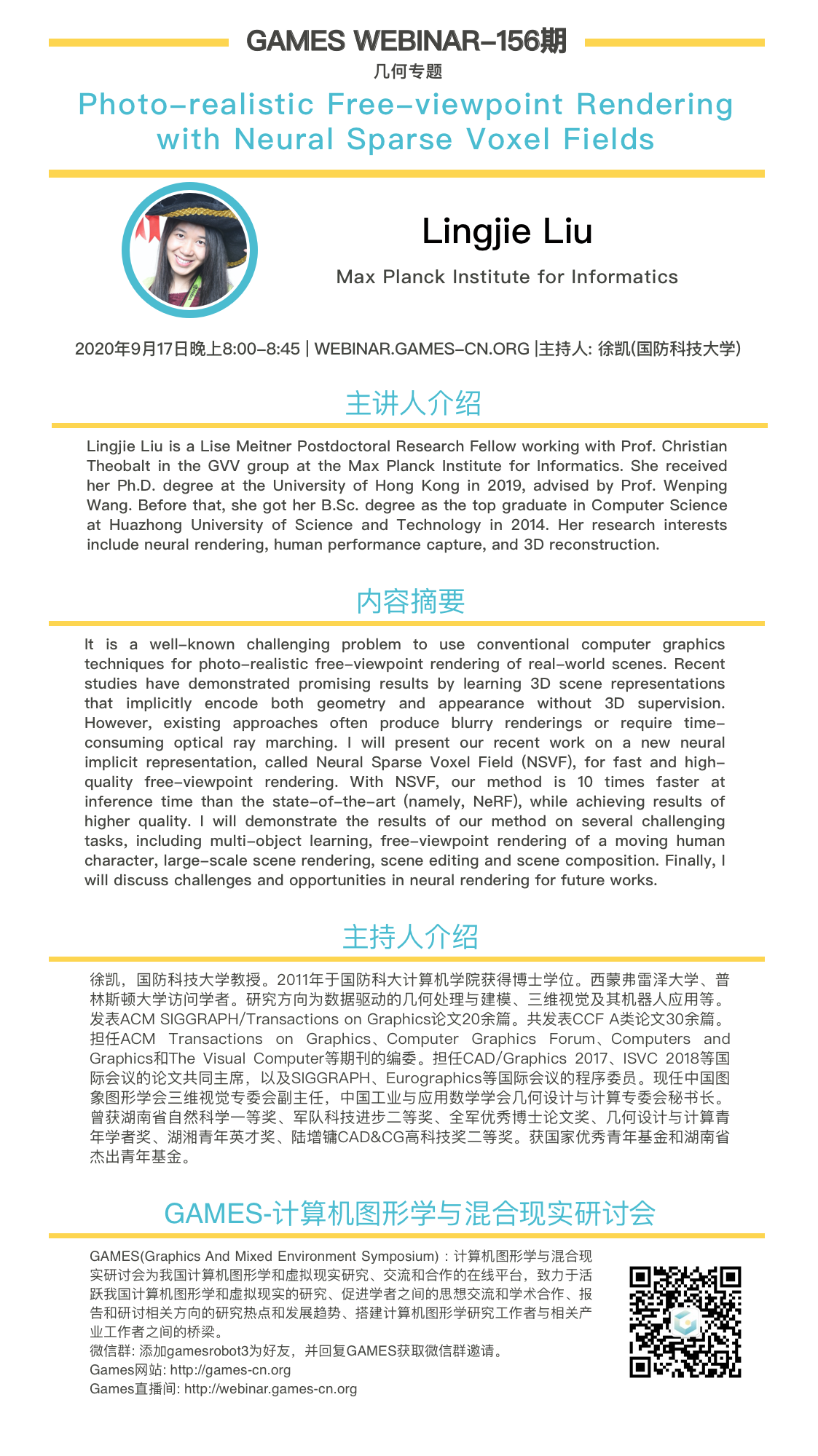
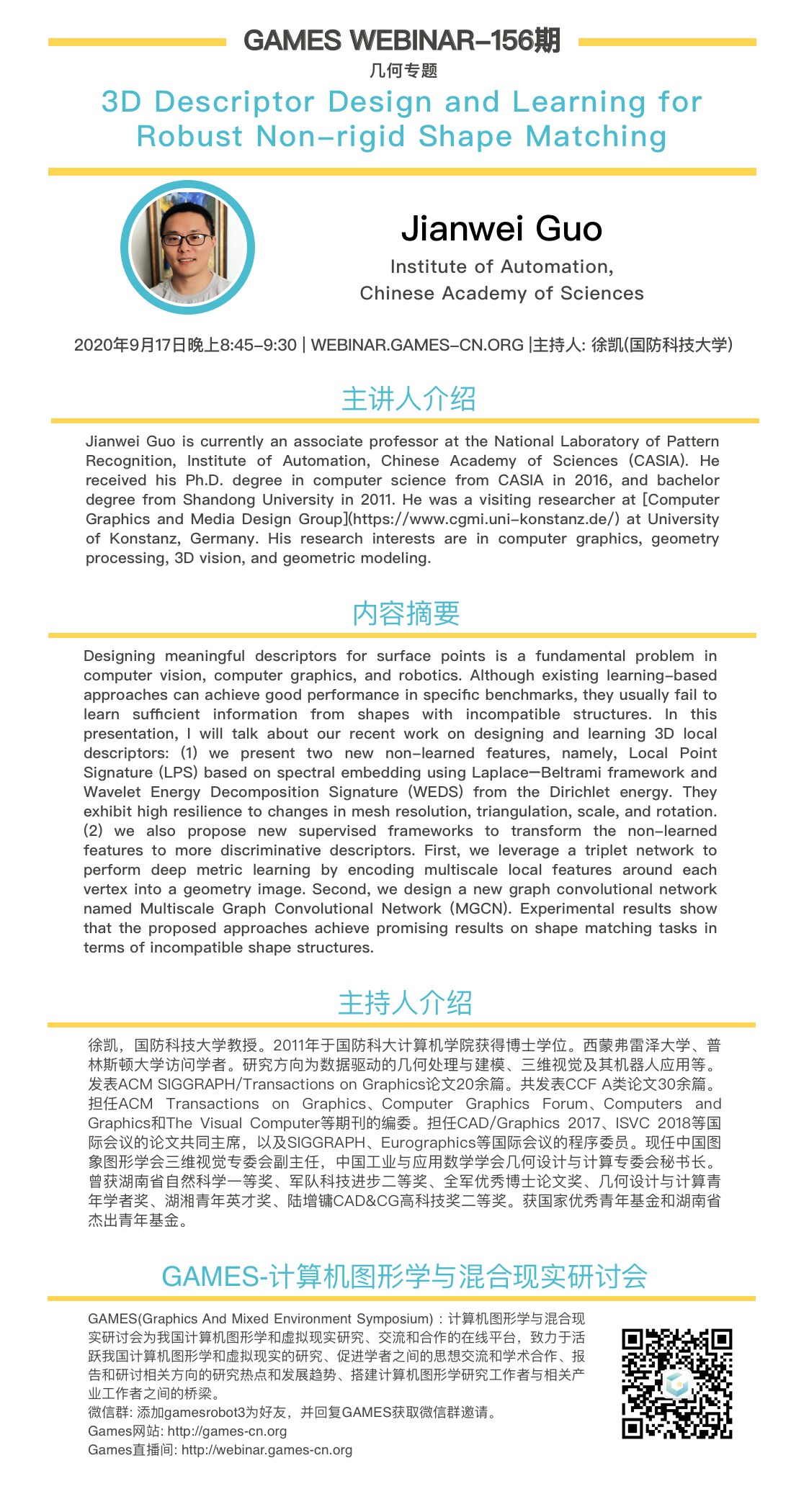
【GAMES Webinar 2020-156期】(几何专题)
报告嘉宾1:Lingjie Liu(Max Planck Institute for Informatics)
报告时间:2020年9月17日晚上8:00-8:45(北京时间)
报告题目: Photo-realistic Free-viewpoint Rendering with Neural Sparse Voxel Fields
报告摘要:
It is a well-known challenging problem to use conventional computer graphics techniques for photo-realistic free-viewpoint rendering of real-world scenes. Recent studies have demonstrated promising results by learning 3D scene representations that implicitly encode both geometry and appearance without 3D supervision. However, existing approaches often produce blurry renderings or require time-consuming optical ray marching. I will present our recent work on a new neural implicit representation, called Neural Sparse Voxel Field (NSVF), for fast and high-quality free-viewpoint rendering. With NSVF, our method is 10 times faster at inference time than the state-of-the-art (namely, NeRF), while achieving results of higher quality. I will demonstrate the results of our method on several challenging tasks, including multi-object learning, free-viewpoint rendering of a moving human character, large-scale scene rendering, scene editing and scene composition. Finally, I will discuss challenges and opportunities in neural rendering for future works.
讲者简介:
Lingjie Liu is a Lise Meitner Postdoctoral Research Fellow working with Prof. Christian Theobalt in the GVV group at the Max Planck Institute for Informatics. She received her Ph.D. degree at the University of Hong Kong in 2019, advised by Prof. Wenping Wang. Before that, she got her B.Sc. degree as the top graduate in Computer Science at Huazhong University of Science and Technology in 2014. Her research interests include neural rendering, human performance capture, and 3D reconstruction
讲者个人主页: https://lingjie0206.github.io/
报告嘉宾2: Jianwei Guo(Institute of Automation, Chinese Academy of Sciences)
报告时间:2020年9月17日晚8:45-9:30(北京时间)
报告题目:3D Descriptor Design and Learning for Robust Non-rigid Shape Matching
报告摘要:
Designing meaningful descriptors for surface points is a fundamental problem in computer vision, computer graphics, and robotics. Although existing learning-based approaches can achieve good performance in specific benchmarks, they usually fail to learn sufficient information from shapes with incompatible structures. In this presentation, I will talk about our recent work on designing and learning 3D local descriptors: (1) we present two new non-learned features, namely, Local Point Signature (LPS) based on spectral embedding using Laplace–Beltrami framework and Wavelet Energy Decomposition Signature (WEDS) from the Dirichlet energy. They exhibit high resilience to changes in mesh resolution, triangulation, scale, and rotation. (2) we also propose new supervised frameworks to transform the non-learned features to more discriminative descriptors. First, we leverage a triplet network to perform deep metric learning by encoding multiscale local features around each vertex into a geometry image. Second, we design a new graph convolutional network named Multiscale Graph Convolutional Network (MGCN). Experimental results show that the proposed approaches achieve promising results on shape matching tasks in terms of incompatible shape structures.
讲者简介:
讲者个人主页: http://jianweiguo.net/
主持人简介:
徐凯,国防科技大学教授。2011年于国防科大计算机学院获得博士学位。西蒙弗雷泽大学、普林斯顿大学访问学者。研究方向为数据驱动的几何处理与建模、三维视觉及其机器人应用等。发表ACM SIGGRAPH/Transactions on Graphics论文20余篇。共发表CCF A类论文30余篇。担任ACM Transactions on Graphics、Computer Graphics Forum、Computers and Graphics和The Visual Computer等期刊的编委。担任CAD/Graphics 2017、ISVC 2018等国际会议的论文共同主席,以及SIGGRAPH、Eurographics等国际会议的程序委员。现任中国图象图形学会三维视觉专委会副主任,中国工业与应用数学学会几何设计与计算专委会秘书长。曾获湖南省自然科学一等奖、军队科技进步二等奖、全军优秀博士论文奖、几何设计与计算青年学者奖、湖湘青年英才奖、陆增镛CAD&CG高科技奖二等奖。获国家优秀青年基金和湖南省杰出青年基金。
GAMES主页的“使用教程”中有 “如何观看GAMES Webinar直播?”及“如何加入GAMES微信群?”的信息;
GAMES主页的“资源分享”有往届的直播讲座的视频及PPT等。
观看直播的链接:http://webinar.games-cn.org
